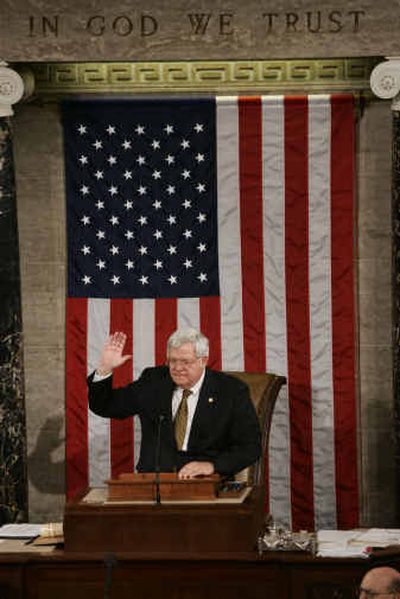Congress convenes, begins bickering

WASHINGTON – Congress reconvened Tuesday for its 109th session and promptly fell back into the kind of partisan squabbling that’s dominated recent years.
House Republicans muscled through a rules change to discourage ethics complaints against lawmakers, and the Senate Republican leader threatened rules changes to get President Bush’s controversial judicial nominees approved.
The eruption of partisanship brought a contentious beginning to what promises to be one of the most ambitious and difficult legislative sessions in memory. Congress will weigh sweeping changes in, among other things, Social Security, the tax code and immigration policy.
In the House of Representatives, Republicans prevailed 220-195 on a vote to change how the House ethics committee approves any investigation of an ethics complaint. The new rule requires a majority vote to start an investigation, and with the panel split evenly between Republicans and Democrats, it assures that a partisan deadlock would stifle any inquiry.
Congressional watchdog groups said the move will “cripple” ethics enforcement in the House.
“We are weakening our ethics laws,” said Rep. Christopher Shays, R-Conn., the only Republican to vote for a Democratic alternative. “I think we’ve lost our minds. The power has gotten to our heads.”
In the Senate, Majority Leader Bill Frist, R-Tenn., warned Democrats that he would seek to change longstanding Senate rules if Democrats continued to block Bush’s judicial nominees.
One of the Senate’s most revered rules – intended to safeguard the rights of the minority – guarantees unlimited debate unless 60 of the 100 members vote to stop the oratory. Republicans now have a 55-member majority. Some have urged Frist to force a change in the rules to permit a simple 51-vote majority to force votes on judicial nominees. Opponents of such a radical change in Senate tradition have warned that such a ploy could lead to parliamentary warfare that would bring the Senate to a standstill.
Frist said he hoped for cooperation. “If my Democratic colleagues exercise self-restraint and don’t filibuster judicial nominees, Senate traditions will be restored,” Frist said. “It will then be unnecessary to change Senate procedures.”
But he vowed to test Democrats next month by seeking a vote on one of several appointees that Democrats blocked last year, and he threatened to change the rules to confirm the president’s choices for the federal bench.
Frist called on senators to “deliver meaningful solutions to the real challenges that confront our nation.” House Speaker Dennis Hastert, R-Ill., vowed to push Bush’s ambitious agenda.
“In this Congress, big plans will stir men’s blood,” Hastert said. “The 109th Congress will be a reform Congress. We have big challenges that face this country, and we need big ideas to meet those challenges.”
Even House Democratic leader Nancy Pelosi of California managed to joke as she handed the gavel to Hastert, who was re-elected to his fourth term as House speaker.
“This is getting tiresome, Mr. Speaker,” Pelosi said. “It is not about you. You’re a man of great character and dignity and deserve our congratulations.”
House Majority Leader Tom DeLay of Texas said changes in the ethics rule were necessary to prevent frivolous complaints from Democrats against Republicans. “That’s part of their longstanding announced strategy – to tear down the institution in order to gain power,” DeLay charged.
Tuesday’s vote came after Republican leaders retreated Monday evening on another proposed rule change that would have made it even harder to discipline members for unethical behavior. They also rescinded another party rule, adopted two months ago, that would have allowed Republican leaders to retain their jobs even if they were indicted on criminal charges.
Both measures were designed to protect DeLay, who was rebuked three times last year by the House ethics committee. Republicans also said they worried that DeLay could become the politically-inspired target of a Texas investigation into political fund raising.
DeLay said Tuesday that he agreed to withdraw the rule on party leaders to deny Democrats an issue. But several Republicans said they’d heard from their constituents during the past month and that rank-and-file members passed their concerns on to party leaders.